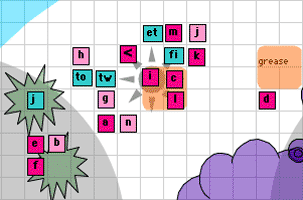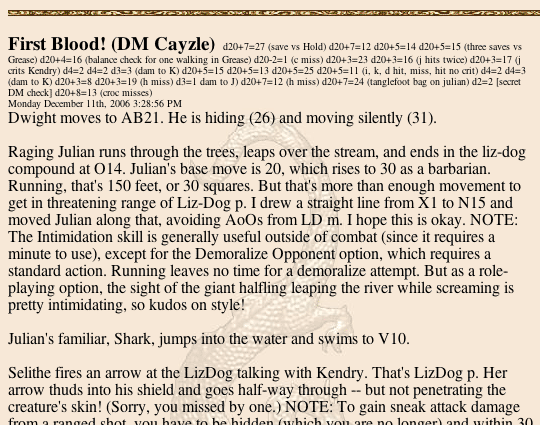I was reading this post over at Treasure Tables. The gist is that your players have more fun in crucial (that is, life-threatening) situations if they have a clear idea of the chance of success for any given course of action. Say you have to decide whether or not to try to save a comrade from otherwise certain death -- knowing your chance of success, the factors (plus and minus either way), and even getting the DM to mention options you might have missed -- all make the decision much easier.
I think, in gaming as in real life, it is less stressful to make a decision if you know as much as you can about your choices before you pick your course of action. The DM can reduce the stress and enhance player fun when everyone knows what die modifiers apply, what damage you might take, and what numbers you need to roll.
I think that's especially true for power-gamers like me. If you know that you optimized your chances as best you could, it's not as painful if the dice turn against you. And it's even sweeter if things work out, because you can feel that your success was of your own making.
But the idea that your players have more fun when they have more information applies to other things that DMs control. Here are two suggestions for keeping your players in the know:
Good Maps -- There's nothing more annoying than a fight in 3E D&D without a map. The rules practically demand it, from attacks of opportunity and flanking to ranges and spell effects. Sure, you can run a simple fight without a map, but it makes everything so much more clear when you have a grid on which to plan your tactics.
 Now, I play online in a play-by-post game, and having a map is even more important when you can't have a conversation with the DM, and when it takes hours, or maybe a day, to get an answer about how far Thing A is from Thing B. You don't need fancy software to make decent maps, either. I find that Excel works just fine.
Now, I play online in a play-by-post game, and having a map is even more important when you can't have a conversation with the DM, and when it takes hours, or maybe a day, to get an answer about how far Thing A is from Thing B. You don't need fancy software to make decent maps, either. I find that Excel works just fine.
Shown is a sample of a map that I recently made running a battle in my current online game. Click the sample map for a Web page with a map for every round, and more (the start of the battle is at the bottom of the page). Note the level of detail and terrain notes. Not to toot my own horn too much, but I've given the players a lot of info here.
Open Die Rolls -- It may be very scary for a DM to venture out from behind the DM screen, but rolling them bones out in the open, with an explanation of how the die modifiers add up, can be really helpful to players trying to figure stuff out. Plus, that makes it easier for your players to understand and adopt your own power-gaming strategies, which is only fair. Why does that NPC paladin always crit? Why does that mounted goblin do so much damage with his lance? Your players will have more fun if they know why and how they are getting the living tar kicked out of them -- so that they can turn the tables on your smug and precious NPCs next session!
That's not to say that there won't be secret DM die rolling. There are always cases for discretion. What's the Move Silent roll for that Invisible Stalker? The players should not know! But in many cases, there's no reason to keep your players in the dark on the mechanics of the game. [What's that you're muttering, you in the corner? But then you can't fudge the die rolls? Well, that's a topic for a future screed!]
Online, it is easy for a DM to post the rolls for the game, with annotations, and let the players read them or not, as they prefer. Here's how I currently do it online, with an example taken from an actual battle:

Look at the teensy text at the top of the post. Those are the die rolls, annotated so players know what they mean. If a player wants to double check my math, or ask me why a modifier is X or Y, they can more easily do so with this info in hand. And those who do not care can choose to save their eyesight and not squint at the die rolls!
Two Exceptions -- Some players prefer a dice-light game (which begs the question of why they are playing D&D, but never mind that). Those players might prefer not to know the mechanical details. They might even like having the DM roll all the dice. If that's what floats your players' boat, then by all means, keep that DM screen firmly in place!
And if you are running a Ravenloft-style game, one good way to keep the players scared is to withhold info! You might even want to keep the PC's hit point totals secret, only telling players more-or-less approximately how wounded they feel. This tends to unnerve players, as you might expect, but in this kind of game, that's the point, no?
But like my Uncle Sy always used to say, "An educated player is our best customer!"

